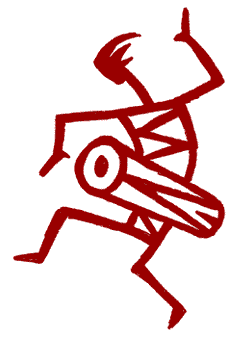

Thought of the Week Archives |
 |

|
|
|
August 12, 2002 Hope and Trust: Truth or Illusion? One of the central theories of both Primal Integration and Buddhism is that hope and illusion keep our illness alive. The Buddha essentially said that suffering occurs when we cling to the illusion (imagination) of desired and expected events. By believing thoughts of future fulfillment, we become lost in this world of imagination instead of the world as it actually is in the moment. Since things that we imagine cannot always come true, hopes often turn into disappointment - and a repeated struggle for renewed hope. In primal theory, children have real physical/emotional needs that must be fulfilled in order for them to grow. When these needs are not met, children are in real pain. It is a biologic imperative that children trust and expect their parents to fulfill their needs. In the unfortunate circumstance that the parents are unable to do this, children respond in two ways: they adjust themselves (their natures) in ways that may make their parents respond, and they build up tremendous hope that their parents will change and finally fulfill their needs. For a child, to "not hope" is to face the fact that they will suffer and never be whole - that their parents are not adequate as parents. Since it is both natural and essential for a growing child to be needy - that is, to drive to fill the vacuum of bodily needs - it is physically impossible for a child to stop needing and stop hoping. To stop hoping/needing would mean not to be, to give up and die. In primal theory, in other words, childhood hope is not an illusion but a function of reality. It is the constant thwarting of the fulfillment of these organic hopes that causes a habitual attachment to the thoughts and dreams that create the Buddhist illusion. The repression of primal pain by the illusion of false hope is the origin of suffering. Neurosis, in its largest sense, is what the Buddha, the "Awakened One," awoke from. In the Merriam Webster on-line dictionary, the following phrases are given in the definitions of the verbs "to hope" and "to trust":
Hope
Trust A healthy parent who can fulfill the hopes/needs of the child becomes someone the child can trust. The child can trust that they will get what they need. They can believe in the truth of that. They can expect and have confidence that their needs will be met, and rely on their parent. They are dependent on their parent, and can depend on them. A child's physical and emotional hunger is a desire with anticipation for fulfillment. When the parent fulfills that desire, the world is a trustworthy place. If the parent does not fulfill those needs and desires, the pain that arises is followed by anger, sadness, and fear. If unfulfillment is frequent, the world becomes a painful, sad, and frightening place. The child loses confidence and trust in the world, and since they are part of this experience, they lose confidence and trust in themselves. Regardless of the situation, the hurting child is organically compelled to keep hoping. Sudden Infant Death Syndrome, which only occurs when babies are alone, may sometimes be caused by an organic loss of hope - which is, for a child, the actual will to live. In some cases, adult religious fervor is an extension of childhood hope focused on the greatest need-fulfiller of all - an even more distant, exalted, and unattainable God Father/Mother. In primal work and Buddhism, we move to break the illusion, to give up hope. This can be easily misunderstood as a prescription for a pointless, depressing life with no meaning. Nothing could be further from the truth. Hope is necessary for a child - but not for an adult. Since a physically mature adult is mechanically capable of meeting their needs, they do not need to hope for someone else to fulfill them - they can get up and do it themselves. They don't need to cling to mental images of what life can be, they have the present moment to live and work in. What is here, what is actually happening, is where the power is - not in images in our minds. I can live on bread, but I can't live on a picture of bread in my mind. When we are lost in emotional projections from childhood, it is the hope that someone (our parents) will finally give us what we need that keeps us stuck. In primal session work, the turning point often comes when we reach for or call for the unavailable parent. That action is often the most excruciating, heartbreaking moment of our lives. It is in this moment that we finally feel and realize that the dream is over. Our parents never gave us the love, protection, and nourishment that we needed - and they never will. The window of opportunity is over. It was lost many, many years ago. We finally give up. A tremendous amount of grieving is necessary when we feel the full extent of this truth and the damage that it caused. It is a piece of emotional work that we never bargained for. Even if people told us, the protective illusion of our hope did not allow us to understand. With that realization and that grieving, however, something wonderful can happen. With the illusion of childhood hope gone, we are off the wheel of suffering. We can leave the struggle-filled merry-go-round, the wild ghost-chase, the search for the one thing that will finally give us what we need. We are here, we are now, we are what we are - and we can finally live. |